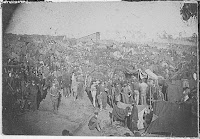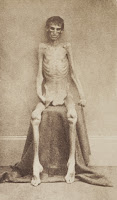Andersonville was a Confederate prisoner of war camp opened in 1863 during the Civil War.
 |
| Andersonville |
Located in Sumter County Georgia this camp was initially called Fort Sumter. The site was picked for it was near the Southwestern Railroad line, which meant moving prisoners and supplies in would not be a problem.
 |
| Henry Wirz |
The original camp was 16.5 acres and was designed to hold 10,000 Union prisoners. Henry Wirz, a southern captain was made the commander of the camp.
 |
| The Deadline. |
A fence 15 to 20 feet tall made of pine logs enclosed this stockade. Twenty feet within this perimeter was a light fence the prisoners nicknamed the “deadline,” for if anyone crossed it they were immediately shot.
The fort was renamed Andersonville because it was confused with South Carolina’s Fort Sumter, located in Charleston Harbor, where the first shots of the war had taken place.
It wasn’t long before the stockade held 20,000 then 30,000 prisoners—it was expanded by a mere 10 acres. Between 1863 and 1865 over 49,000 Unions prisoner were held captive within its walls.
The south unable to feed its own had no supplies to spare for this camp. The living conditions were horrendous. The prisoners were housed in wooden huts and tents that afforded no protection from the elements.
 |
| Drawing rations. |
Between March and August of 1864, typhoid, typhus, infected wounds and starvation took the lives of 3,000 men a month. In all, close to 14,000 prisoners died while held captive at Andersonville.
Those prisoners that survived, suffered from hunger, thirst, lice, and scurvy.
A brief respite came in August of 1864 after a rainy period. A natural spring bubbled up within the stockade and supplied desperately needed water.
 |
| The captain waiting for execution. |
When the war ended the North was horrified at the conditions of this prison. Captain Henry Wirz was tried for war crimes and convicted. He was hanged on November 10, 1865.
His ghost is one of many Civil War ghosts seen around the stockade today. He is often seen walking along the road that leads to the old prison.
Andersonville prison and cemetery were opened as a National Historical site in 1970.
Many visitors to this site have gotten more than they bargained for. Witnesses have reported hearing and seeing strange sights especially on foggy summer nights. These sightings have been reported for over a century.
According to Jeff Belanger’s book, Ghosts of War: Restless Spirits of Soldiers, Spies, And Saboteurs, a female visitor at the site talked to a ghost.
She was walking through the grounds when she stopped in the middle on a hill. She closed her eyes to take in what she was feeling and heard a voice. She looked around but no one was there.
She closed her eyes once more.
She thought, “Were you a prisoner here?” The voice replied, “Yes.” She then asked, “Did you die here?” Again she heard, “Yes.”
Before she left she asked the man his name. Later she gave this name to one staff member. He looked it up and sure enough the soldier’s unusual name popped up on the prisoner list.
Belanger also notes another ghost is often seen. Motorists that pass the stockade’s cemetery on Highway 49 state they have seen a Catholic priest standing near a curve in the road on rainy days.
This ghost is believed to be Father Peter Whelan. He was a Confederate chaplain who was liked by all—including the prisoners.
Another ghost is seen in Andersonville’s cemetery. There are 13, 714 Union soldiers buried here. Multiple witnesses have described this ghost exactly the same way.
He has only one leg and is seen hobbling around using a crude crutch. People state that he does not walk on the ground but instead several feet above it.
 |
| Cemetery before wooden markers were replaced. |
One paranormal group had a fairly intense night within the stockade. All their equipment’s batteries drained—which happens a lot at this site—they then heard a huge group of men talking. They saw no one.
They heard an individual voice with a pronounced southern drawl demand, “Who goes there?”
 |
| One starved prisoner. |
As the night went on they heard what sounded like a pan being hit with a spoon and a man’s voice pleading for “mercy.” They heard the sound of a horse galloping across the field in the area where the original prison stood.
A fog settled over the field and they saw a campfire and men moving around it. They then smelled the aroma of food cooking.
The next morning as one of the investigators woke up in his hotel room he spotted the ghost of a man in a Confederate uniform staring at him. He then watched as this figure walked through his shut and locked door.
The next morning as one of the investigators woke up in his hotel room he spotted the ghost of a man in a Confederate uniform staring at him. He then watched as this figure walked through his shut and locked door.

